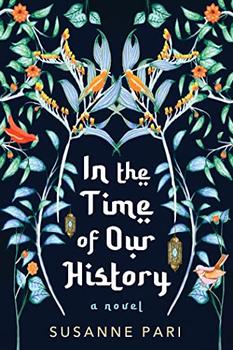Summary | Excerpt | Reading Guide | Reviews | Beyond the Book | Readalikes | Genres & Themes | Author Bio

After all these years, Shireen still hadn't adjusted fully to Olga's absence. Just last week, she'd woken from her nap and nearly called for Olga to pour tea so they could have their usual afternoon chat. She thought about phoning her now and resisted; they'd already had their weekly conversation. Anyway, the telephone was never as intimate as a person's presence in the house. How odd she still found it that she'd become so reliant on a servant for companionship. Children were apt to do that with their wet nurses or their nannies, but it was unseemly in an adult, which was why Yusef had finally thrown her out and sent her back to Iran. No, she should never have been a housemaid at all, being literate and multilingual and modern thinking, but it had been the least complicated strategy for coming to America at the time.
Shireen gave up on her makeup and went into the bathroom to wash her face. Mitra would not arrive until noon to collect her for lunch; she had two hours to tame her tears and lift herself out of this ugly mood. She went into her closet, still redolent with Yusef's lime-scented shower gel, and pulled on her usual ensemble: black below-the-knee skirt, black blouse, black sweater, black-tinged pantyhose. The color of mourning, but Shireen had never worn bright colors. She slid into her leather slippers; she would come back for her pumps later. In the floor-length mirror, she inspected the lay of the fabric on her body, looked for wrinkles, snags, stains. She'd long ago stopped being critical of her figure; it was well-proportioned for her average height. Never a beauty, not willowy or voluptuous like her husband's mistresses, she was aware that having less prettiness to miss as it crumbled was a blessing. At family gatherings, she wanted to scream at her friends and relatives who talked endlessly about the maintenance of youth and beauty. It was a game that a woman ultimately lost badly. Best not to participate at all. As Olga used to say (and Olga had experienced more in the way of men and lust than anyone else Shireen knew): In the end, a woman is better off being admired for her dignity than for her appeal to men or the appraisal of women. That was a road taken by fools. And with a husband like Yusef, Shireen had had to grasp the straws of dignity early. It had taught her appreciation, she thought proudly. Appreciation for her home and her garden, for her children and grandchildren. Tears welled up again, and she turned her face from the mirror, rearranged several of Yusef's hanging suits so that the grays and blacks were together.
Back in the bathroom, Shireen unpinned her dark hair and ran a large-toothed comb through the wavy tresses that reached the middle of her back. She always pulled her hair into a bun, but when Anahita was a child—even when she was older, bless her heart— she would sit behind Shireen in the evenings and braid it while they watched TV. What joy and comfort that touch had brought her! Anahita had frizzy hair that she could not stand to grow out long enough to braid. All through adolescence, she kept it at chin-length and ironed it so that when Shireen kissed her cheek the odor of singed hair struck her. Mitra had inherited Shireen's hair, and she let it fly free, no buns for her, and certainly no sense of responsibility where lusty men were concerned. That's their problem, Mitra would retort. Shireen still wondered where her oldest daughter had learned to think like that. Anahita had innately understood that it was a traditional woman's responsibility to refract unwanted male attention, a concept Mitra once denounced as a direct offshoot of the idea of hejab, invented and perpetuated by men who didn't want to take responsibility for their own lust. Not that Mitra flaunted herself. She simply had no use for such values; she was too busy with what was going on in her mind. They have opposite natures, Olga used to say when Shireen would fret about her daughters. Nothing you can do, Madame, but accept it.
Excerpted from In the Time of Our History by Susanne Pari. Copyright © 2023 by Susanne Pari. Excerpted by permission of Kensington Publishing. All rights reserved. No part of this excerpt may be reproduced or reprinted without permission in writing from the publisher.




I always find it more difficult to say the things I mean than the things I don't.
Click Here to find out who said this, as well as discovering other famous literary quotes!
Your guide toexceptional books
BookBrowse seeks out and recommends the best in contemporary fiction and nonfiction—books that not only engage and entertain but also deepen our understanding of ourselves and the world around us.